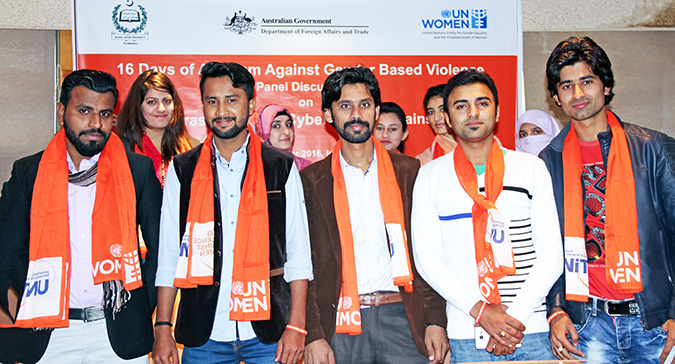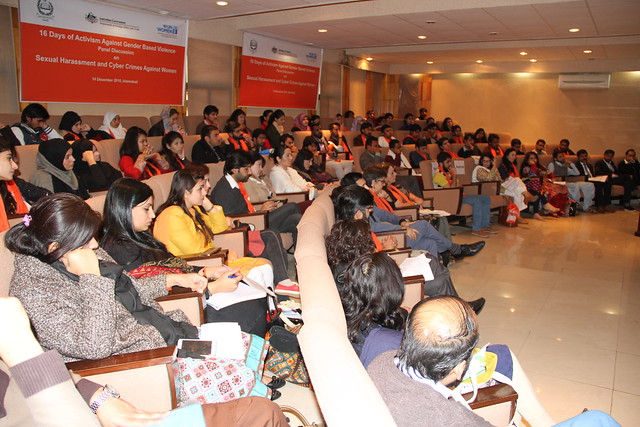Cyber Harassment, on-campus and off-campus, is just as damaging to women as Physical Violence
Date:
[Press Release]
Islambad, Pakistan — Cyber violence is something that has troubled many of us as cyber harassment on-campus and off-campus is just as damaging to women as physical violence and abuse experienced at home and in public spaces.

This new driver of potential harmful gender inequality, was reflected upon during a panel discussion held on 14 December 2016, by the Quaid-i-Azam University (QAU), Islamabad, in collaboration with UN Women (the United Nations Entity for Gender Equality and the Empowerment of Women) with support from and the Australian Government.
A report launched last year by the United Nations Broadband Commission (with input from UN Women, UNDP, UNESCO and ITU), warns that women are growing even more vulnerable to cyber violence as more and more regions gain internet access. The report also reveals that almost 73 per cent of women have endured cyber violence, and that women are 27 times more likely as men to be harassed online.
Pakistan’s Federal Investigation Agency received more than 170 complaints of cyber-crime against women in Punjab in 2014, and last year there were more than 5,000 complaints nationwide, with almost half of them related to data shared over Facebook.
With Pakistan’s Facebook users having crossed a landmark of 25 million users (of which 15-20 million are men and 5-6 million are women), and a two-third majority are under the age of 25, there is a need to combat cyber violence by working harder and more effectively together, to better protect the growing number of women and girls, on-campus and off-campus, who are victims of online threats and harassment.
In opening the session, Mr. Jamshed Kazi (Country Representative, UN Women, Pakistan) stated: “No doubt, the continuum of violence against women (VAW) is as troubling online, as it is offline. It is not a minor problem; it is a big problem that must concern us just as much as the violence experiences by women offline, which we say is a pandemic.” He added: “To be disconnected from technology in the 21st century, is like having your freedom disrupted: your right to work, your right to meet people, your right to learn, your freedom of speech. So, if women become so intimidated and traumatized from cyber violence, it’s a whole world that will be lost to them for the rest of their life. We need to constantly make the point about the advantages of education and technology for women.”
In her remarks, Ms. Margaret Adamson (High Commissioner of Australia to Pakistan) said: “Cyber harassment is not only a violation of privacy, it is criminal abuse that can have fatal consequences for its victims. Cyber harassment affects us all but most victims are women and girls. Australia is supporting Pakistan's efforts to eliminate all forms of violence against women and girls, including in cyber space. We are contributing AUD 250,000 to UN Women's initiative to mobilize Pakistani youth to put forward recommendations to Provincial Governments to help address sexual harassment and violence against women in real and virtual public spaces.”
Dr. Farzana Bari (Chairperson Gender Studies Center, QAU) spoke on efforts to collect data on VAW: “Every day we hear of gross violations and rampant cases of VAW; we must declare a ‘violence against women emergency’ in Pakistan. The biggest gap in research on VAW remains the political will of successive governments to systematically collect nationwide and multi-sectoral data to identity the nature, extent, causes and magnitude of crimes against women. There are several micro-level studies and data on VAW available, however discrepancies exist between their recorded numbers. Other issues to be addressed are the implications and fear women have in reporting such cases, and a need for researchers to assume a victims-centered approach to respond to survivor and victims’ calls for assistance.”
Speakers during the panel discussion on “Cyber Crimes against Women: Prevalence, Legal Protection and Redressal Mechanisms” were Ms. Luavut Zahid (Gender & Tech Coordinator, Digital Rights Foundation (DRF)) and Mr. Hassan Iftekhar Malik (Forensic Expert, Federal Investigation Agency (FIA)).
Ms. Luavut Zahid shared that in Pakistan women are not seen as owners of on-line spaces. Most users by some estimates reveal around 75-80 per cent are men; as there are not many women users, we are already a minority online. When women start getting harassed they tend to retreat, and when we concede space, there is likelihood that the harassment will grow. It was highlighted that the internet is not new, and we are still understanding its technology – for online shopping, social networking and even completing assignments. When we start thinking of what the internet can offer, there is so much more, but simultaneously as we don’t see ourselves as owners of the space we do not know how to manage its digital trail and associated resistance.
Mr. Hassan Iftekhar spoke firstly of the overwhelming number of cyber-crimes being reported to the FIA mainly by women facebook users - currently 6,000 and growing in number - and secondly, the online cyber complaint mechanism and how cases are handled by FIA. Awareness over internet norms, conditions and behavior of use is required as social media is a new platform for many Pakistani’s as the internet becomes more accessible for may uses. In remaining vigilant against cyber harassment, students and participants were made aware of the life cycle of cyber harassment – it begins with cyber stalking, hacking, harassment and indecent proposals. “Prevention is better than cure, and prevention is through awareness,” he stressed.
Speakers during the panel discussion on “Campus Safety: Implementation of Sexual Harassment Act, Challenges and Recommendations” were Ms. Maliha Hussain (Director, Mehergarh), Mr. Wasim Hashmi (Advisor, Higher Education Committee (HEC)) and Dr. Anila Kamal (Member, Inquiry Committee, QAU).
Ms. Maliha shared that under the anti-sexual harassment law and its implementation whilst everyone has a role to play - juniors to seniors, seniors to juniors – in creating safe spaces for everyone, much of the responsibility lies with senior management. Students were encouraged to familiarize themselves with the law and implementation mechanisms.
Mr. Wasim Hashmi spoke of the dissemination process of the legislative guidelines to private and public academic institutions, and the detailed process, with case studies, of how harassment cases are and have been probed by the HEC.Dr. Anila Kamal shared results of a survey undertaken in 2013 by the University, three years after implementation of the anti- sexual harassment bill to assess the awareness of students around this Act. Among the male students, nearly 83.9 per cent knew of the bill, of which 13.5 per cent knew it was implemented in QAU, and of the female students, 76.1 per cent knew of the bill, and only 7 per cent knew of its University level implementation. Out of the male teachers, 85.7 per cent knew of the bill and 42.9 per cent knew of its implementation. More interestingly, none of the female teachers knew of the bill or of its implementation in QAU. The process was detailed on how to successfully address on-campus sexual harassment.
Panelists also discussed concrete steps of how to take the bill and its implementation further, which concluded with recommendations made by the Gender Studies Department to review and amend the reporting process at QAU in line with Sexual Harassment Act 2010 (by removing additional layers of reporting), and the Departments reaffirmation to strengthen implementation of the law (by displaying the Code of Conduct, and awareness-raising sessions for students and faculty on a regular basis) and conduct trainings of inquiry committee members.
Today’s event concludes UN Women’s 16 Days of Activism against Gender Based Violence for this year which focused on ending violence against women through enhancing women’s legal protection, access to services and safe spaces including safe campuses, and internet safety.
Photo Gallery
For more information contact:
Faria Salman
Strategic Management and Partnerships Officer &
Head of Communications for UN Women Pakistan
Email: [ Click to reveal ]
